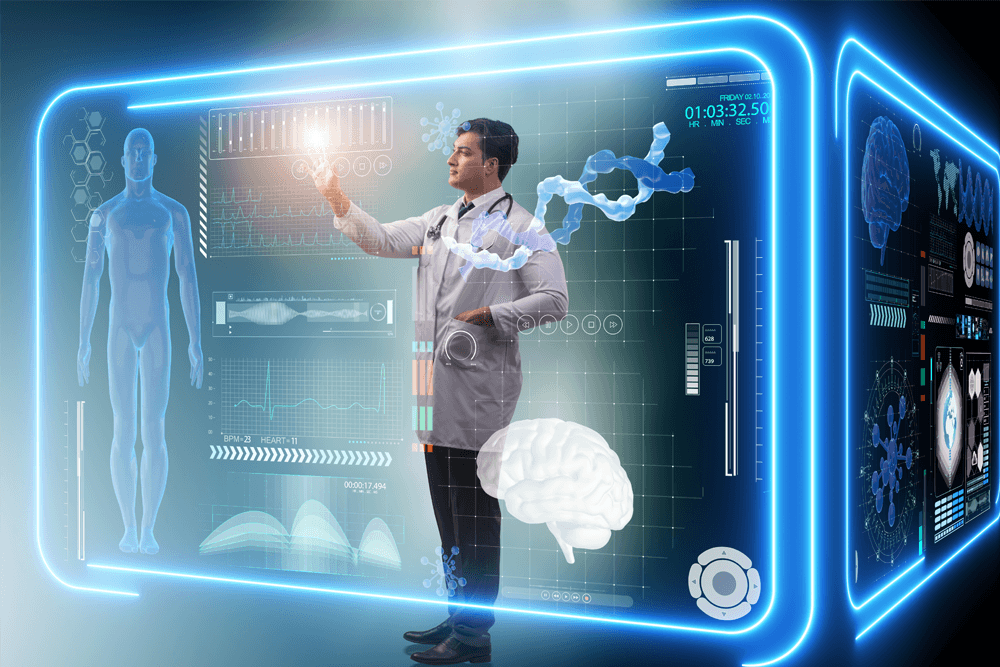

Artificial Intelligence is revolutionizing healthcare, from diagnosis to treatment. Let’s explore this topic in more detail with 2048 Game below. AI’s potential to transform medicine is immense, promising faster and more accurate diagnoses, personalized treatments, and improved patient outcomes. (Let’s learn more about this topic below with 2048 Game)
Artificial Intelligence has made significant strides in the healthcare industry, transforming various aspects of medical practice and research. From improving diagnostic accuracy to streamlining administrative tasks, AI is reshaping the way healthcare professionals work and patients receive care. One of the most prominent applications of AI in healthcare is in medical imaging and diagnostics. Machine learning algorithms can analyze medical images such as X-rays, MRIs, and CT scans with remarkable precision, often outperforming human radiologists in detecting abnormalities and early signs of diseases like cancer.
AI-powered systems are also being used to analyze electronic health records (EHRs) and identify patterns that may indicate potential health risks or drug interactions. This capability enables healthcare providers to offer more personalized and proactive care to their patients. Additionally, AI is being employed in drug discovery and development, significantly reducing the time and cost associated with bringing new medications to market. By analyzing vast amounts of data and simulating molecular interactions, AI can help researchers identify promising drug candidates more quickly and efficiently.
Read more: Top AI Career Paths and How to Get Started
One of the most exciting areas where AI is making significant contributions is in the realm of diagnosis and treatment planning. AI algorithms can process and analyze vast amounts of medical data, including patient histories, genetic information, and current symptoms, to provide more accurate and timely diagnoses. This capability is particularly valuable in complex cases where multiple factors need to be considered simultaneously. For instance, AI systems have shown remarkable success in detecting early signs of diseases such as Alzheimer’s, Parkinson’s, and various types of cancer, often before human doctors can spot them.
In treatment planning, AI is helping healthcare professionals develop more personalized and effective strategies for their patients. By analyzing a patient’s genetic makeup, lifestyle factors, and response to previous treatments, AI can suggest tailored treatment plans that are more likely to succeed. This approach is particularly promising in oncology, where AI can help oncologists determine the most effective combination of therapies for each individual cancer patient. Moreover, AI is being used to predict patient outcomes and potential complications, allowing healthcare providers to take preventive measures and adjust treatments as needed.
AI’s ability to process and analyze large datasets is also revolutionizing preventive care and public health management. By identifying patterns and risk factors across populations, AI can help healthcare systems allocate resources more efficiently and target interventions where they are most needed. For example, AI algorithms can predict outbreaks of infectious diseases by analyzing data from various sources, including social media, weather patterns, and travel information. This capability has proven invaluable during the COVID-19 pandemic, helping health authorities to anticipate and respond to surges in cases more effectively.
On an individual level, AI-powered wearable devices and smartphone apps are enabling continuous health monitoring and early detection of potential issues. These technologies can track vital signs, physical activity, sleep patterns, and other health indicators, alerting users and their healthcare providers to any concerning changes. This proactive approach to health management has the potential to significantly reduce the burden on healthcare systems by preventing the progression of chronic diseases and catching acute conditions early.
While the potential benefits of AI in healthcare are immense, its implementation also raises important ethical and practical challenges that need to be addressed. One of the primary concerns is the protection of patient privacy and data security. As AI systems rely on vast amounts of sensitive medical data to function effectively, ensuring the confidentiality and proper use of this information is crucial. Healthcare organizations and technology companies must work together to develop robust security measures and transparent data governance policies to maintain public trust in AI-powered healthcare solutions.
Another significant challenge is the potential for bias in AI algorithms. If not carefully designed and trained on diverse datasets, AI systems may perpetuate or even exacerbate existing healthcare disparities. For instance, an AI trained primarily on data from one demographic group may not perform as well when applied to patients from different backgrounds. Addressing this issue requires a concerted effort to ensure that AI development in healthcare is inclusive and takes into account the diverse needs of all patient populations.
The rapid advancement of AI in healthcare also presents challenges for regulatory bodies and healthcare institutions. Existing regulatory frameworks may not be adequately equipped to evaluate and approve AI-based medical technologies, potentially slowing down their adoption or failing to ensure their safety and efficacy. Developing appropriate guidelines and standards for AI in healthcare is crucial to balance innovation with patient safety. Additionally, integrating AI systems into existing healthcare workflows and infrastructure can be complex and resource-intensive. Healthcare providers need to invest in training their staff to work effectively with AI technologies and adapt their processes to incorporate these new tools.
Furthermore, there are concerns about the potential overreliance on AI in medical decision-making. While AI can be an invaluable tool for healthcare professionals, it should not replace human judgment and empathy in patient care. Striking the right balance between AI assistance and human expertise is essential to ensure that patients receive the best possible care. Healthcare providers must be trained to understand the capabilities and limitations of AI systems and to use them as complementary tools rather than substitutes for their own clinical judgment.
Looking ahead, the future of AI in healthcare appears both exciting and transformative. As AI technologies continue to evolve and mature, we can expect to see even more groundbreaking applications that have the potential to revolutionize medical practice and improve patient outcomes. One area of particular promise is the development of more sophisticated AI-powered virtual assistants and chatbots. These systems could provide patients with 24/7 access to medical advice, triage services, and mental health support, helping to alleviate the pressure on healthcare systems and improve access to care, especially in underserved areas.
Another exciting prospect is the integration of AI with other cutting-edge technologies such as robotics, augmented reality, and the Internet of Things (IoT). For instance, AI-powered surgical robots could enhance the precision and safety of complex procedures, while augmented reality systems guided by AI could assist surgeons in real-time during operations. In the realm of personalized medicine, AI could play a crucial role in analyzing an individual’s genetic data, lifestyle factors, and environmental influences to create truly tailored treatment plans and prevention strategies.
Read more: AI vs Human Intelligence What You Need to Know
AI is also set to accelerate the pace of medical research and discovery. By analyzing vast amounts of scientific literature, clinical trial data, and genetic information, AI systems can help researchers identify new drug targets, predict drug interactions, and design more effective clinical trials. This capability could significantly reduce the time and cost associated with bringing new treatments to market. Moreover, AI-powered simulations of biological systems and disease processes could provide researchers with valuable insights and help them test hypotheses without the need for extensive laboratory experiments.
In the field of genomics, AI is poised to unlock new insights into the genetic basis of diseases and help develop more targeted therapies. As our understanding of the human genome grows, AI algorithms can help identify complex genetic patterns associated with various conditions and predict an individual’s susceptibility to certain diseases. This knowledge could lead to more effective preventive measures and personalized treatment strategies based on a patient’s unique genetic profile.
As we look to the future of healthcare, it’s clear that AI will play an increasingly central role in shaping how we prevent, diagnose, and treat diseases. While challenges remain, particularly in areas such as data privacy, algorithmic bias, and regulatory frameworks, the potential benefits of AI in healthcare are too significant to ignore. By addressing these challenges thoughtfully and ethically, we can harness the power of AI to create a healthcare system that is more efficient, effective, and equitable for all. The ongoing integration of AI into healthcare represents not just a technological shift, but a fundamental transformation in how we approach health and medicine in the 21st century.